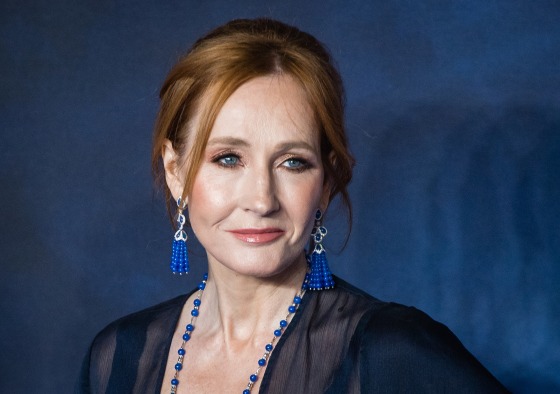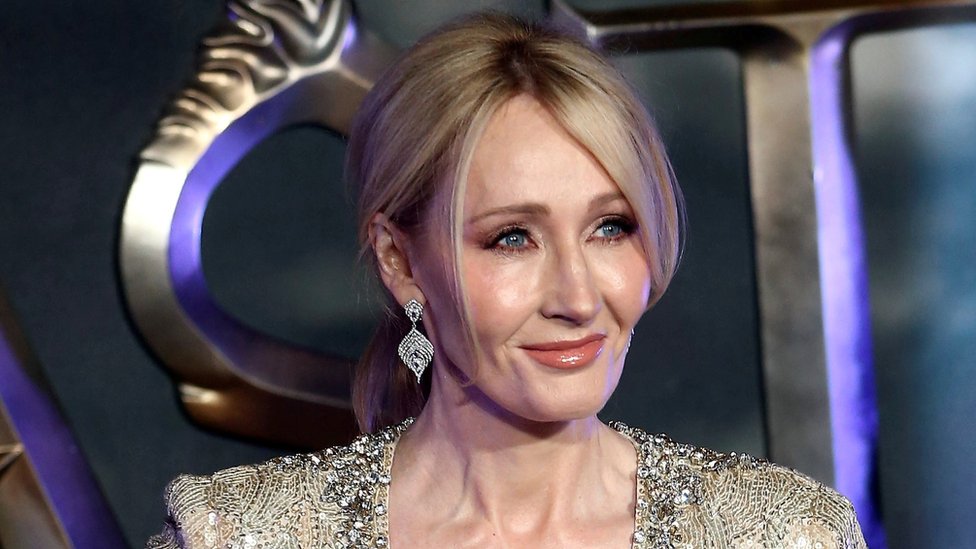“It feels like an unprompted attack on kids who are reading her books and read them as a 7-year-old,” The Trevor Project’s Tia Dole said.

J.K. Rowling in London on Nov. 13, 2018.Samir Hussein / WireImage/Getty Images file
When Patrouious Raymond Achatz was in kindergarten, “Harry Potter” was his bedtime story.
At night, his mother would read from the books and, later, as he learned to read on his own, he continued to devour the pages that revealed the wizarding world to him. Achatz, now 26, of Pittsburgh, also watched every film adaptation of “Harry Potter.”
“If anything, Harry Potter has taught me that no one should have to live in the closet,” he said. “It’s very disappointing with J.K. Rowling’s tweets, that are very transphobic, because when we read the Harry Potter books, it helps us escape in a way.”
Achatz, who is transgender, is one of the “Harry Potter” fans left hurt and frustrated after the series’ author J.K. Rowling made several tweets Saturday deemed transphobic and TERF-y (trans-exclusionary radical feminist), which experts warned are harmful to the transgender, nonbinary and gender-nonconforming community.
Rowling appeared to take issue with a headline that used the phrase “people who menstruate,” which is language inclusive of people like transgender men, nonbinary and gender-nonconforming people, all of whom could be people who menstruate, rather than using the word “women.”
“‘People who menstruate.’ I’m sure there used to be a word for those people. Someone help me out. Wumben? Wimpund? Woomud?” Rowling tweeted. In several subsequent tweets, as critiques began rolling in, Rowling doubled down.

Although the tweets are not the first time Rowling has been accused of making transphobic remarks, the most recent tweets have left fans of the series attempting to reconcile the books and films that helped shape their childhoods with the author they now see as bigoted.
“Overall, it is devastating when someone that you love or that you look up to rejects you and says things about you that are really unkind, and, frankly, cruel, unnecessarily so,” Tia Dole, the chief clinical operations officer for The Trevor Project, said. “My sense is this is such a shock. It feels like an unprompted attack on kids who are reading her books and read them as a 7-year-old.”
Jaye, 23, who lives in California and asked that she only be identified by her first name, is a self-described former Harry Potter fan.
“I’ve been reading the series since I was really young. I was reading the books before I was allowed to watch the movies,” she said. “I went to the midnight releases of every book that came out when I was alive and the movies.”
Jaye, who is transgender, said she was taken by the themes of friendship that Rowling weaved throughout the series. It was only when Rowling began retroactively making characters of the series members of the LGBTQ+ community, that Jaye began to feel uneasy.
“That struck me as very odd and I thought, ‘Maybe I can look past it’ … but the first instance of transphobia that I saw from her and this weird obsession with women being people who menstruate and all this weird TERF-y stuff was happening right as I was coming out as trans last summer,” Jaye said.
As Jaye learned about TERFs and transphobia during her transition, she said she was shaken to know that one of her idols appeared to align with that ideology.
“To have someone whose work I identified with for so long be the most prominent one of this new group of bigots that I just discovered— it kind of rocked me to my core,” she said.
Transphobia and transphobic comments can have serious consequences for those on the receiving end, according to data from The Trevor Project. A peer-reviewed study conducted by The Trevor Project and published in the Journal of Adolescent Health showed that transgender and nonbinary youth were almost 2½ times as likely to experience depressive symptoms, seriously consider suicide, and attempt suicide compared to their cisgender lesbian, gay, bisexual, queer and questioning peers.
Additionally, when a young transgender person has gender-affirming care in their life, it can greatly reduce their risk of suicide, according to The Trevor Project. LGBTQ youth who reported having at least one accepting adult were 40 percent less likely to report a suicide attempt in the past year.
While transphobic language affects all members of the community negatively, it’s important to acknowledge that transphobia is an intersectional issue and Black transgender women are disproportionately affected by violence, according to Dole.
“The amount of bravery for a trans woman of color to live her life the way she wants to live her life and the amount of risk she takes stepping out of her home is incredible,” Dole said.
However, some young trans people said that while Rowling’s comments are hurtful, they will not stop loving the series that meant so much to them.
Ashton, 15, a GenderCool Champion of The GenderCool Project, which describes itself as “a youth-led movement replacing misinformed opinions with positive, powerful experiences meeting remarkable kids who identify as transgender and nonbinary,” said he’s aware of the weight of transphobic comments but that won’t come between him and the books and movies that helped to shape him.
“I have a tremendous love for the series. The relationships that I created with the characters, their experiences and the lessons I learned over the years, have really helped me become the person and young person that I am today,” Ashton said.
Rowling’s tweets also appeared to draw pushback from stars of the films her work has birthed — including Harry Potter himself. Daniel Radcliffe, who stars as the titular character in the films, published a letter with The Trevor Project on Monday, affirming that trangender women are women.
“To all the people who now feel that their experience of the books has been tarnished or diminished, I am deeply sorry for the pain these comments have caused you. I really hope that you don’t entirely lose what was valuable in these stories to you. If these books taught you that love is the strongest force in the universe … then that is between you and the book that you read, and it is sacred,” Radcliffe wrote.
Eddie Redmayne, star of the “Fantastic Beasts and Where to Find Them” series, also refuted Rowling’s tweets, according to statement made to Variety.
“This is an ongoing process. As someone who has worked with both J.K. Rowling and members of the trans community, I wanted to make it absolutely clear where I stand. I disagree with Jo’s comments. Trans women are women, trans men are men and nonbinary identities are valid,” Redmayne said.
For Amber Briggle, whose son Max, 12, is trans, hearing the actor reaffirm the identity of trans people gave her hope after the initial wave of hurt and frustration caused by Rowling.
“I thought Daniel Radcliffe’s statement was really powerful … I think silence equals complicity and I think he’s recognizing that and I think it’s really powerful what he said,” Briggle said.
:strip_icc():format(jpeg)/kly-media-production/medias/3527114/original/096943800_1627744974-JK_Rawling.jpg)





